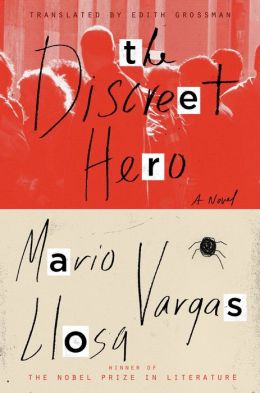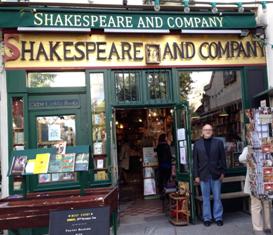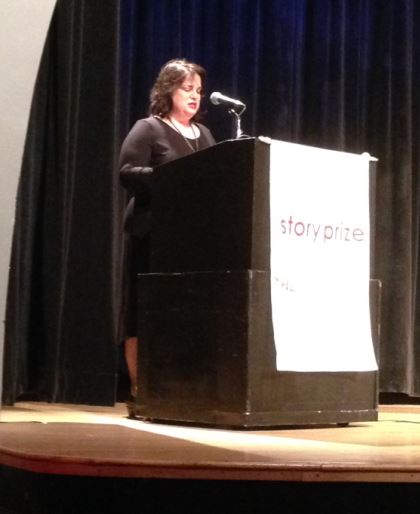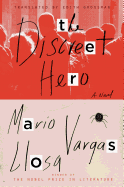 Two sorely mistreated octogenarians come up with some dramatic solutions to their problems, which get all tangled up with each other in The Discreet Hero by Mario Vargas Llosa, the 2010 winner of the Nobel Prize for Literature.
Two sorely mistreated octogenarians come up with some dramatic solutions to their problems, which get all tangled up with each other in The Discreet Hero by Mario Vargas Llosa, the 2010 winner of the Nobel Prize for Literature.
Insignificant-looking Felícito Yanaqué, the frugal and hardworking head of a trucking business in the little Peruvian town of Piura, has received an extortion note from an anonymous source, signed only with a drawing of a spider. Crime is on the rise in thriving, rapidly growing Piura, so it's no surprise that someone is hitting up successful Felícito for protection money. But his sharecropper father's dying words were an admonition never to let anyone walk all over him. Elderly Felícito becomes the hero of the town by publicly defying the extortionists in the local newspaper.
At the same time, Ismael Carrera, prosperous insurance salesman in Lima, has overheard his treacherous twin sons discussing his eventual death with eager anticipation. In defiance, he has decided to marry his devoted servant, Armida, and cut his sons out of the inheritance before they find out about it.
What neither of these two octogenarians realize is that Felícito's wife and Ismael's mistress are sisters. While those two plots begin to entangle one another, an old favorite from previous Vargas Llosa novels, 62-year-old Don Rigoberto (In Praise of the Stepmother and The Notebooks of Don Rigoberto), is retiring from Carrera's insurance company. Don Rigoberto has a handsome teenage son, Fonchito, who is apparently being stalked by a sad, clever, seductive man who may very well be the devil.
To unravel the ensuing shenanigans, Vargas Llosa brings in two detectives from his earlier fiction, Captain Silva and Sergeant Lituma (Who Killed Palomino Molero?); their camaraderie and unorthodox procedures add yet another dimension to this multifaceted, rich and wise "old man's novel." A blind beggar, a broad-hipped secretary, a clairvoyant holy woman, a Chinese grocer and a nervous black chauffeur round out the cast.
What makes it all work are the characters. The multi-stranded plot, with its liberal dose of coincidence, is mostly an excuse to bring all these likable, full-bodied personalities together. Vargas Llosa's love for them is contagious. Though the identity of the anonymous extortionist is discovered halfway through, the book rattles happily along for another hundred pages with characters so endearing most readers won't mind. With Vargas Llosa in control, it's all a pleasure--and he doesn't reveal the solution to one final mystery until the last delicious page. --Nick DiMartino, Nick's Picks, University Book Store, Seattle, Wash.
Shelf Talker: Two Peruvian octogenarians set out to foil some ruthless predators scheming after their wealth in Nobel Prize winner Mario Vargas Llosa's novel of family, social class and inheritance.
 "Here, you're not likely to find cut-rate bargains, but you may find something you didn't even know you were seeking, like a rare title recommended by our biblio-insatiable staff. Or you may discover a first edition that we ourselves discovered in a private collection, a book hitherto tucked onto a shelf of an elegant Parc Monceau flat. Or you may read on our blog about a singer/songwriter's passion for Swedish literature and then decide to sample a new author or two.
"Here, you're not likely to find cut-rate bargains, but you may find something you didn't even know you were seeking, like a rare title recommended by our biblio-insatiable staff. Or you may discover a first edition that we ourselves discovered in a private collection, a book hitherto tucked onto a shelf of an elegant Parc Monceau flat. Or you may read on our blog about a singer/songwriter's passion for Swedish literature and then decide to sample a new author or two.


SHELFAWARENESS.1222.S1.BESTADSWEBINAR.gif)


SHELFAWARENESS.1222.T1.BESTADSWEBINAR.gif)
 Tomorrow,
Tomorrow, 
 This spring
This spring  "We are proud of the role we have played in building a destination progressive bookstore in D.C.," said Teaching for Change executive director Deborah Menkart. Teaching for Change is in the midst of a national expansion of its programs that provide teachers and parents with tools to create schools "where students learn to read, write, and change the world."
"We are proud of the role we have played in building a destination progressive bookstore in D.C.," said Teaching for Change executive director Deborah Menkart. Teaching for Change is in the midst of a national expansion of its programs that provide teachers and parents with tools to create schools "where students learn to read, write, and change the world." The U.S. Postal Service offered a preview of the Forever Stamp honoring Maya Angelou and announced that the First-Day-of-Issue stamp dedication ceremony will take place at April 7 in Washington, D.C. The stamp can be
The U.S. Postal Service offered a preview of the Forever Stamp honoring Maya Angelou and announced that the First-Day-of-Issue stamp dedication ceremony will take place at April 7 in Washington, D.C. The stamp can be  After winning the $20,000
After winning the $20,000  Congratulations to
Congratulations to  From Buzzfeed: "We recently asked members of the BuzzFeed Community for the
From Buzzfeed: "We recently asked members of the BuzzFeed Community for the  "I love getting lost in a good book about some slice of history. I'm especially glad to do so if the book is by author Erik Larson.
"I love getting lost in a good book about some slice of history. I'm especially glad to do so if the book is by author Erik Larson. The Wolf Who Ate the Sky
The Wolf Who Ate the Sky Two sorely mistreated octogenarians come up with some dramatic solutions to their problems, which get all tangled up with each other in The Discreet Hero by Mario Vargas Llosa, the 2010 winner of the Nobel Prize for Literature.
Two sorely mistreated octogenarians come up with some dramatic solutions to their problems, which get all tangled up with each other in The Discreet Hero by Mario Vargas Llosa, the 2010 winner of the Nobel Prize for Literature.